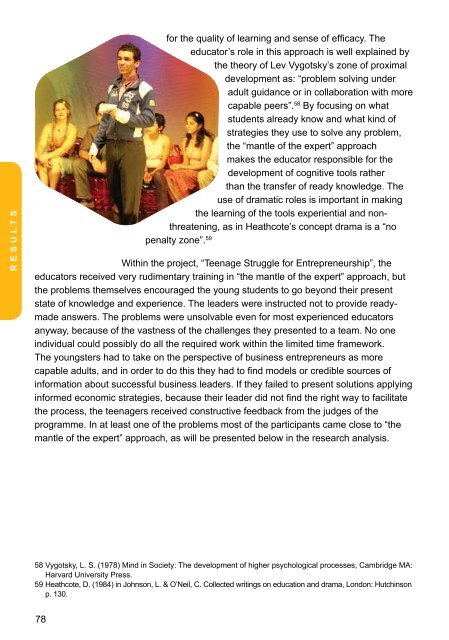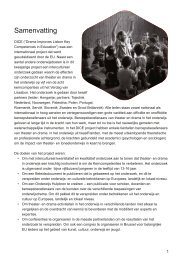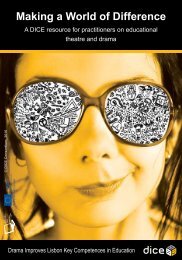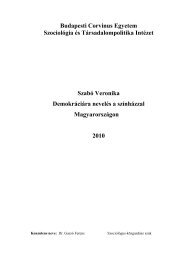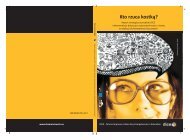Policy Paper - Drama Improves Lisbon Key Competences in Education
Policy Paper - Drama Improves Lisbon Key Competences in Education
Policy Paper - Drama Improves Lisbon Key Competences in Education
Create successful ePaper yourself
Turn your PDF publications into a flip-book with our unique Google optimized e-Paper software.
R e s u l t s<br />
for the quality of learn<strong>in</strong>g and sense of efficacy. The<br />
educator’s role <strong>in</strong> this approach is well expla<strong>in</strong>ed by<br />
the theory of Lev Vygotsky’s zone of proximal<br />
development as: “problem solv<strong>in</strong>g under<br />
adult guidance or <strong>in</strong> collaboration with more<br />
capable peers”. 58 By focus<strong>in</strong>g on what<br />
students already know and what k<strong>in</strong>d of<br />
strategies they use to solve any problem,<br />
the “mantle of the expert” approach<br />
makes the educator responsible for the<br />
development of cognitive tools rather<br />
than the transfer of ready knowledge. The<br />
use of dramatic roles is important <strong>in</strong> mak<strong>in</strong>g<br />
the learn<strong>in</strong>g of the tools experiential and nonthreaten<strong>in</strong>g,<br />
as <strong>in</strong> Heathcote’s concept drama is a “no<br />
penalty zone”. 59<br />
With<strong>in</strong> the project, “Teenage Struggle for Entrepreneurship”, the<br />
educators received very rudimentary tra<strong>in</strong><strong>in</strong>g <strong>in</strong> “the mantle of the expert” approach, but<br />
the problems themselves encouraged the young students to go beyond their present<br />
state of knowledge and experience. The leaders were <strong>in</strong>structed not to provide readymade<br />
answers. The problems were unsolvable even for most experienced educators<br />
anyway, because of the vastness of the challenges they presented to a team. No one<br />
<strong>in</strong>dividual could possibly do all the required work with<strong>in</strong> the limited time framework.<br />
The youngsters had to take on the perspective of bus<strong>in</strong>ess entrepreneurs as more<br />
capable adults, and <strong>in</strong> order to do this they had to f<strong>in</strong>d models or credible sources of<br />
<strong>in</strong>formation about successful bus<strong>in</strong>ess leaders. If they failed to present solutions apply<strong>in</strong>g<br />
<strong>in</strong>formed economic strategies, because their leader did not f<strong>in</strong>d the right way to facilitate<br />
the process, the teenagers received constructive feedback from the judges of the<br />
programme. In at least one of the problems most of the participants came close to “the<br />
mantle of the expert” approach, as will be presented below <strong>in</strong> the research analysis.<br />
The educators, or more precisely the coaches, of “Teenage Struggle for<br />
Entrepreneurship” were focused on teach<strong>in</strong>g objectives def<strong>in</strong>ed by the detailed<br />
descriptions of the knowledge, skills and attitudes correspond<strong>in</strong>g to the doma<strong>in</strong> of the key<br />
competence of entrepreneurship. The problems offered to their teams also related to the<br />
follow<strong>in</strong>g framework:<br />
FRAMEWORK FOR KEY COMPETENCES IN A KNOWLEDGE-BASED SOCIETY 60<br />
Def<strong>in</strong>ition of the competence Knowledge Skills Attitudes<br />
Entrepreneurship has<br />
an active and a passive<br />
component: the propensity to<br />
br<strong>in</strong>g about <strong>in</strong>novation oneself,<br />
but also the ability to welcome<br />
and support <strong>in</strong>novation brought<br />
about by external factors.<br />
Entrepreneurship <strong>in</strong>cludes<br />
welcom<strong>in</strong>g change, tak<strong>in</strong>g<br />
responsibility for one’s actions<br />
(positive or negative), sett<strong>in</strong>g<br />
objectives and meet<strong>in</strong>g them<br />
and hav<strong>in</strong>g the motivation to<br />
succeed<br />
Knowledge<br />
of available<br />
opportunities<br />
<strong>in</strong> order to<br />
identify those<br />
suited to one’s<br />
own personal,<br />
professional and/or<br />
bus<strong>in</strong>ess activities<br />
Table 18. The description of the competence “Entrepreneurship”<br />
The competence consists of the follow<strong>in</strong>g elements of knowledge,<br />
skills and attitudes as appropriate to the context:<br />
Skills for plann<strong>in</strong>g, organis<strong>in</strong>g,<br />
analys<strong>in</strong>g, communicat<strong>in</strong>g,<br />
do<strong>in</strong>g, de-brief<strong>in</strong>g, evaluat<strong>in</strong>g<br />
and record<strong>in</strong>g. Skills for<br />
project development and<br />
implementation. Ability to<br />
work co-operatively and<br />
flexibly as part of a team.<br />
Be<strong>in</strong>g able to identify one’s<br />
personal strengths and<br />
weaknesses.<br />
• Ability to act proactively<br />
and respond positively to<br />
changes.<br />
• Ability to assess and take<br />
risks as and when warranted<br />
Disposition to show<br />
<strong>in</strong>itiative.<br />
Positive attitude<br />
to change and<br />
<strong>in</strong>novation.<br />
Will<strong>in</strong>gness to identify<br />
areas where one can<br />
demonstrate the full<br />
range of enterprise<br />
skills — for example<br />
at home, at work and<br />
<strong>in</strong> the community<br />
The educators and the students were asked to fill <strong>in</strong> questionnaires with open-ended<br />
questions:<br />
1. How did you understand the mission of this programme?<br />
2. What k<strong>in</strong>d of previous knowledge among the students turned out to be useful <strong>in</strong><br />
solv<strong>in</strong>g the problems?<br />
3. What k<strong>in</strong>d of knowledge did you see be<strong>in</strong>g developed <strong>in</strong> the process of solv<strong>in</strong>g the<br />
tournament problems?<br />
4. What did the students do to solve the problems?<br />
Which skills were most difficult to learn?<br />
5. What k<strong>in</strong>d of motivation did the students have to work on the problems?<br />
6. How would you describe the change that the tournament brought to the students’<br />
entrepreneurial competence?<br />
7. What was the possible source of satisfaction for the teenagers?<br />
8. What k<strong>in</strong>d of advice would you give to the participants of the next edition of the<br />
tournament?<br />
R e s u l t s<br />
58 Vygotsky, L. S. (1978) M<strong>in</strong>d <strong>in</strong> Society: The development of higher psychological processes, Cambridge MA:<br />
Harvard University Press.<br />
59 Heathcote, D. (1984) <strong>in</strong> Johnson, L. & O’Neil, C. Collected writ<strong>in</strong>gs on education and drama, London: Hutch<strong>in</strong>son<br />
p. 130.<br />
60 Source: EU Comission implementation of "<strong>Education</strong> and Tra<strong>in</strong><strong>in</strong>g 2010" work programme, work<strong>in</strong>g Group B "<strong>Key</strong><br />
competences" for lifelong learn<strong>in</strong>g, a European reference framework November 2004.<br />
78<br />
79


